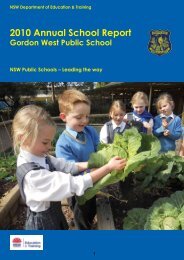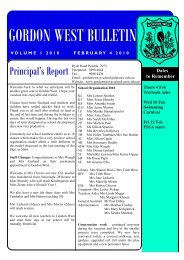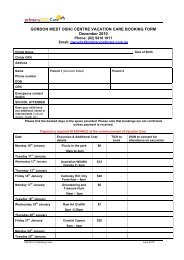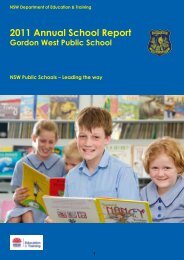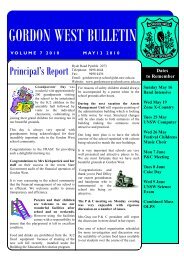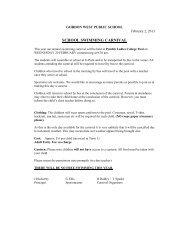2012 Annual School Report - Gordon West Public School
2012 Annual School Report - Gordon West Public School
2012 Annual School Report - Gordon West Public School
Create successful ePaper yourself
Turn your PDF publications into a flip-book with our unique Google optimized e-Paper software.
Finding and Conclusions<br />
Parents<br />
The <strong>School</strong>Map evaluation instrument was used to evaluate<br />
whether:<br />
1. My child's classroom is an interesting place to learn.<br />
2. Teachers talk to me about my child's learning.<br />
3. My child has access to good equipment that helps him/her<br />
to learn.<br />
4. People other than my child's teacher help him/her to learn.<br />
5. The school expects students to achieve to the best of their<br />
ability.<br />
6. Students at the school demonstrate pride in their learning.<br />
7. In class, my child's teachers provide a balance of independent<br />
and group learning activities.<br />
8. My child tries to do things in the classroom that are new<br />
and different.<br />
9. My child looks at samples of his/her work over time to see<br />
how he/she has improved.<br />
10. Teachers at the school are continually upgrading their<br />
skills.<br />
11. Teachers share ideas about teaching and learning with<br />
other teachers.<br />
A total of 98 parents responded to the <strong>School</strong>Map best practice<br />
survey. Parent responses were mostly positive. The 2<br />
statements which rated most highly were “The school expects<br />
students to achieve to the best of their ability” (86%) and “My<br />
child's classroom is an interesting place to learn.” (97%) Less<br />
positively judged statements were “My child looks at samples<br />
of his/her work over time to see how he/she has improved.”<br />
(45%) and “Teachers talk to me about my child's learning.”<br />
(51%)<br />
These results indicate that the school’s vision “to be seen as a<br />
school of excellence, with a definite purpose and direction” is<br />
well supported. Both parents and students acknowledge the<br />
school’s high expectations for student learning, with an emphasis<br />
on all students striving to achieve their personal best.<br />
The importance of schools providing interesting, challenging<br />
environments is recognised by all stakeholders. Students' beliefs<br />
about their ability to learn are shaped by messages and<br />
experiences at home, at school, and in the community. At <strong>Gordon</strong><br />
<strong>West</strong>, staff aim to provide a balance of cooperative and<br />
independent learning activities and challenging, relevant instruction<br />
which helps to engage and foster student motivation.<br />
Some parents surveyed (19% of responses were Rarely) believe<br />
the school could further improve in the area of student<br />
self evaluation. In order to become lifelong learners, teachers<br />
need to both model and teach students the importance of self<br />
evaluation and provide regular opportunities for meaningful<br />
self assessment of learning outcomes. Reflection of one’s own<br />
performance allows students to evaluate themselves,<br />
assess what they know or do not know and give vital feedback<br />
to teachers which can help determine future goals. In <strong>2012</strong><br />
as part of the Numeracy target teachers discussed the importance<br />
of self evaluation and the need to encourage students<br />
to be more active participants in their education. In 2013 each<br />
Stage will adopt the self evaluation strategy of maintaining a<br />
reflection journal. Through targeted questioning, students will<br />
be asked to appraise themselves, to become more familiar<br />
with their own strengths and weaknesses and be able to set<br />
individual, realistic goals that they feel they can attain.<br />
<strong>Gordon</strong> <strong>West</strong> is always looking at ways to improve and refine<br />
its existing processes and practices. Greater student self<br />
responsibility towards their own learning and behaviour is<br />
an area we will continue to develop. The school is also keen<br />
to build a more productive relationship between home and<br />
school through continuing to advance open, clear communication.<br />
In 2013 the school will trial conducting parent teacher<br />
interviews at the conclusion of Term 1 rather than after school<br />
reports are distributed in Term 2 which has been the tradition<br />
over past years. This will provide a formal occasion for parents<br />
and teachers to discuss concerns earlier in the school year.<br />
Recognising the importance of parent/teacher communication,<br />
<strong>Gordon</strong> <strong>West</strong> invites parents to attend information nights<br />
in Term 1 where the expectations for the school year are expressed<br />
and discussed. Other school events including P&C<br />
meetings and Kindergarten Orientation are forums for ongoing<br />
parent/teacher communication. The school strongly encourages<br />
parents to contact the school and request an interview<br />
whenever they would like to discuss issues with teachers or<br />
the principal. Likewise teachers contact parents to notify them<br />
of concerns and discuss early intervention strategies.<br />
Student<br />
A total of 146 students from Year 3 and 4 were surveyed.<br />
Overall the survey results indicated that the students at <strong>Gordon</strong><br />
<strong>West</strong> were positive to the school’s teaching and learning<br />
practices. Students rated most positively to statements regarding<br />
the school setting high expectations for student learning<br />
(87%) and student self responsibility to learning. (80%) The<br />
statement addressing teacher/parent communication scored<br />
less positively (30%) than all other 10 statement responses.<br />
Staff<br />
Staff surveyed consistently and favourably in response to the<br />
12 statements about Learning. The statements emphasising<br />
high community expectations of student outcomes, the use<br />
of a wide range of appropriate resources, students taking responsibility<br />
for their learning, students having opportunities to<br />
do things that are new and different and the provision of learning<br />
opportunities within a stimulating and secure environment<br />
scored strongly (100%). The statement focusing on the opportunities<br />
for students to reflect on their learning and engage in<br />
self assessment (86%) was identified as the aspect requiring<br />
greater prominence in the future.<br />
Future Directions<br />
The evaluation of survey results identified certain areas for<br />
future development including the need for the school to:<br />
• implement teaching and learning strategies such as reflection<br />
journals to allow students greater opportunities to evaluate<br />
their own learning and provide feedback for future goal<br />
setting<br />
• continue to improve the effectiveness of teacher/parent communication<br />
19



